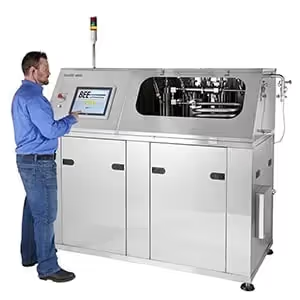
Safety and efficacy are the central measurable criteria of any pharmaceutical drug. They may be analyzed by the manufacturer during clinical trials or compared to other drug products by a consumer in the store. Production of a product that will stand out above others requires laboratory equipment that supports synthesis of high-quality product ingredients. In this edition of the Pion blog, we ask the questions all laboratory managers should ask themselves before purchasing a homogenizer intended for pharmaceutical applications. (1)
- Why do I need a homogenizer?
The benefits of homogenizers are numerous, and it is a valuable tool with which to have laboratory access. But before moving into selection criteria, it is vital to ask yourself why you need a homogenizer. Are you conducting R&D and need to disrupt yeast cells? Will you be mass-manufacturing a product that has been approved for market? Some companies, such as Pion, produce separate homogenizers for each phase of drug development, and models like the Nano DeBEE are better suited for R&D, compared to their manufacture-ready industrial homogenizer.
- What motor power does my product require?
This feature is key in that a homogenizer with a higher motor power capacity typically confers a decreased noise level and quicker homogenization. Particularly for researchers who handle high volumes of samples, they should seek out a homogenizer with high motor power capacity for optimal processing efficiency; for example, some motors can be programmed to run up to 1800 watts.
- Do I have a desired tube capacity and/or mixing speed?
In other words, how many tubes need to be mixed simultaneously and what speed do they need to be mixed at? This factor may be relevant for laboratories that are producing high volumes of a single product, such as in the latter stages of clinical trials or in manufacturing. Additionally, it will be important to prioritize a high mixing speed for applications requiring high speed homogenization.
- Does my product require a specific particle size?
Many products, particularly pharmaceuticals such as vaccines, inhalants, targeted drug delivery, and anesthetics, require consistency in texture and size to achieve safety and efficacy. If your laboratory is synthesizing a product that requires particle sizes at or below 100 µm, you will be able to narrow down your field of homogenizers. Many high pressure homogenizers can produce emulsions, dispersions, and suspensions at particle sizes of 100 µm or higher, yet a select few can achieve down to 0.1 µm. The Micro DeBEE from Pion, for example, can achieve 0.1 µm and would be an appropriate selection for a product with this specification.
If you are able to identify even one of the above criteria as a priority, you will be able conduct your homogenizer search in a more focused manner; this should optimally yield a purchase that provides maximum laboratory output.
Begin your search by comparing the laboratory homogenizers from Pion's Technology. Our products are trusted by pharmaceutical researchers and lab managers around the world for delivering an array of key benefits; these include production of nano/micro emulsions, dispersions, lipids, and suspensions. In addition, we have extensive experience in the challenges that our pharmaceutical customers face as they transition from concept, through to R&D, clinical trials, all-important FDA approval and finally, to manufacturing.

